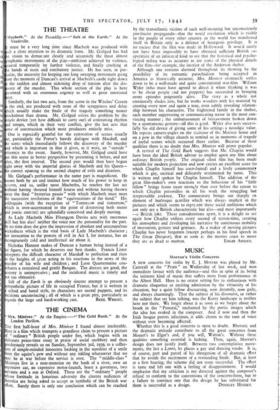THE THEATRE
must be a very long time since Macbeth was produced with ch a close attention to its dramatic form. Mr. Gielgud has had
e vision to demarcate clearly and accurately the three almost .mphonic movements of the p'-ay—ambition achieved by violence, cured temporarily by further violence, and finally crashing at e hands of stem and retributory justice. He has seen, in par- cular, the necessity for keeping one long sweeping movement going om the moment of Duncan's arrival at Macbeth's castle right down the sudden and almost sickening drop of tension after the dis- very of the murder. This whole section of the play is here sented with an enormous cogency as well as great emotional rce.
Similarly, the last two acts, from the scene in the Witches' Cavern the end, are produced with none of the scrappiness and delay t hich usually make the finale of the tragedy something nearer h ockabout than drama. Mr. Gielgud solves the problem by the mple device (yet how difficult to carry out) of contrasting rhythm d tempo, which in their very conflict, give the last acts that nse of construction which most producers entirely miss.
One is especially grateful for the restoration of scenes usually t, particularly the Porter's bawdy dialogue with Macduff, and e scen3 which immediately follows the discovery of the murder
d which is important in that it gives, as it were, an " outside " ference to the event. Surely, however, Mr. Gielgud could have t this scene in better perspective by presenting it before, and not ter, the first interval. The second part would • then have begun ght away with the imperial glories of Macbeth and his Queen—
e correct opening to the second chapter of evils and disasters. Mr. Gielgud's performance in the name part is magnificent. He nows both by art and instinct how much of his power to keep in eserve, and so, unlike most Macbeths, he reaches the last act thout having shouted himself hoarse and without having thrown way the final " hysterica passio " with which Macbeth must meet
e successive revelations of the "equivocations of the fiend." His oliloquies (with the exception of "Tomorrow and tomorrow," hich is over-accentuated to the point of destroying both metre nd poetic content) are splendidly conceived and deeply moving. As Lady Macbeth Miss Ffrangcon Davies acts with enormous kill but has alas! neither the voice nor the personality for the part. no time does she give the impression of absolute and unscrupulous 'ckedness which is the vital basis of Lady Macbeth's character ; er invocation to the powers of evil in Act I, for instance, has an congruously cold and intellectual air about it. Nicholas Hannen makes of Duncan a human being instead of a ay figure, for which he deserves our best thanks. Francis Lister terprets the difficult character of Macduff to perfection and rises s. a the heights of great acting in his reactions to the news of the urder of his wife and children; and Leon Quartennaine con- 'butes a restrained and gentle Banquo. The dresses are good, the enery is unimpressive ; and the incidental music is timely and at too obtrusive. Salt of the Earth is an obviously sincere attempt to present a ympathetic picture of life in occupied France, but it is written in 3 stilted and banal style, its characters are unreal puppets, and its cidents unconvincing; all of which is a great pity, particularly as I egards the large and hard-working cast. BASIL WRIGHT.


























 Previous page
Previous page